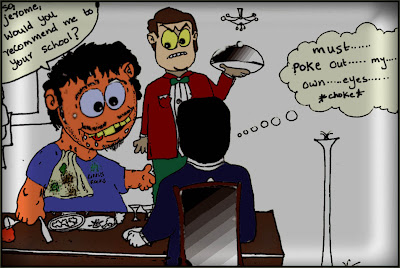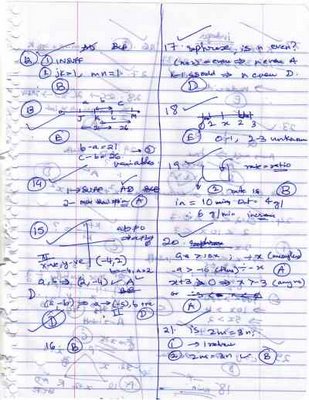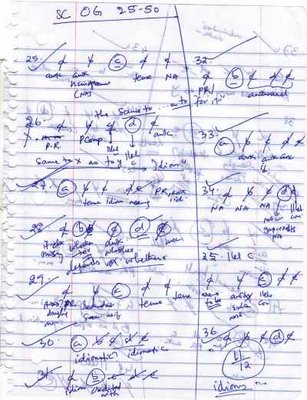Having difficulty with GMAT Quant? Here are some of my tips and strategies that'll help you what to watch out for, and be ready for GMAT traps. Just like how many test prep companies give names to different strategies/methods/approaches etc - I've done the same, this should make it simpler.
The original post is available here -
http://www.gmatclub.com/phpbb/viewtopic.php?t=34329 and for some reason if you can't access it, here is the reproduced text as of 28 Aug.
GMAT Quant strategies
Here are a few strategies that helped me (they were borne out of many tips the members here have given over a period of time). Math whizzes may not find them helpful, for people like us - who go from low 600s to 700s might find them useful. Like how these prep companies give names to specific strategies, I too have given each technique/trap a name so you can identify them. Hopefully some people will find this helpful.
Some generic Quant points
1.
It is possible, even with 9-11 mistakes, to get 48-49 in Quant. So don't freak out because you think you got 3 questions wrong. The test is adaptive - i.e. every question does not carry equal weight. It does appear, however, that early questions do determine how your test will progress.
2. I've noticed, through my multiple GMATPrep tests, that
even if you get more wrong in the end, you can still maintain a high score.
3.
To go from Q(49) to Q(50) or Q(51) is going to be hard - if you have time constraints for studying (like I did), and you aren't a math whiz (which I'm not), then you need to understand what your trade-offs are - i.e. what topics you are willing to relax on and guess in the test. I basically studied enough to solve simple problems in permutations and combinations, and told myself - "if it looks hard and I can't think of a way to solve it in 30seconds, I'm going to use my 'good-looking-number' strategy (which I'll cover here) and just move on.
4. If you spend over 4 minutes on a question, you certainly are
excited about digging your own grave, or you're probably an adrenalin junkie who loves to jump off a cliff without a parachute.
5. With practice, you'll realize that the real time saver in Quant is actually DS and not PS.
GMAT Quant
Is not actually very hard in itself, but when you combine the time pressure, the tricks in the question and the wording - it becomes very important that you have practiced many standard questions types, many times over - because when you see a question, you don't want to be thinking "hmmm...which of my 34 cool strategies might work for this?", you want to be going straight into solving it.
7 Trap identifiers
Many GMAT questions have subtle traps in them - but thankfully, you can categorize many of them - they have a pattern. I've tried to identify 6 of them. So look out for these! At the end of the day, if even 1 of these helped you get 2 questions right bumping you from 660 to 680, it's still good, right?
Each strategy/trap identifier is not a stand-alone, a GMATQuestion might require you to employ more than one at a time. They are listed in no particular order of importance.
These tips can help if you are forced to guess, but want to make an intelligent guess, or if you want to shorten your path to solution (or salvation)
1. The Lone Wolf
A lone wolf question almost always has a free standing number(or numbers), and a more complex looking equation as the other option. For e.g.
"On a loan, evil necromonger charges X% interest in the first year, and Y% interest in the second. If he loaned Rhyme 20,000$ in 2006, how much Rhyme pay by interest in 2008?"
A) X = 10
B) (X + Y + XY/100) = 100
You can almost be certain, that in such questions, your equations to the stem will reduce to a form that looks like (B), so (A) is actually redundant. Be careful of lone wolves because they will bite you in the posterior if you choose (C).
If you notice a lone wolf question, and you have no clue on how to solve the problem, choose (B) (or whichever is the complex equation).
*as a side note, a wolf, contrary to the popular belief, is a very social mammal and is not at all a loner.
2. The Spy Girl
In a typical movie, an unsuspecting man may be enchanted by a hot looking woman, who comes on to him easily. He sleeps with her only to be stabbed in the moring, and all his nuclear secrets stolen. That's what a spy girl question does - it looks real simple, and if you fall for it - you've had it.
Consider this
if the membership of the drama club and music club are combined, what % of the combined membership will be male?
(1) of the 16 members of the drama club 15 are male
(2) of the 20 members of the music club, 10 are male
On the outset, it's very simple. (C) should tell us, right? wrong! DS is picky. This is an overlapping sets question, so you need to consider if some belong to both clubs - and that would lead to (E).
When you get spy girl questions, take a few seconds to re-read the question, looking for holes and any tricky stem ends. Many GMAT sentence tricks are at the end of the question stem. Spy girl questions are often in DS, and typically masquerade as word translations.
3. Twin trouble
Some DS questions have 2 choices that both reduce to the same form! When you see 2 similar looking/structurally similar answer choices, quickly scan them to see if they reduce to a common form. For e.g.
"Question: blah blah blah..."
A) 2x+3y = 10
B) 3.2x+4.8y = 16
Cool! 2 simultaneous equations with 2 unknowns - so should be (C), right? wrong. If you multiply (A) by 1.6, you get (B). They're useless. In general, twin trouble questions end up with (E) as the answer (E is the best choice if you do not know how to solve the problem. If you do know, then if either A or B works - then D would be the answer)
4. C of pain
GMAT questions love to put two choices that seem to give a nice answer when combined. If you get (C) as the answer, unless you're absolutely sure of your approach, look closely at A or B again. Consider your equations to see if they can be solved with only A or B before confirming C. There are certainly more A, B, D choices in GMAT than C. If you are absolutely stumped by the question and you want to guess, this approach might help.
-if the 2 choices look very similar in structure, apply the 'twin trouble' tip - if it is a twin trouble, then E is the most likely answer. D comes next.
-if the choices look very different, go with the one that has a more complex looking wording or equation - and preferably does not allude to an addition.
-if you have absolutely no idea at all, and you must guess - choose D or E.
5. The Rambler
Ramblers are long worded, paragraph level questions. Ramblers have lot of BS in them - so scan the question, then come back to writing equations. Ramblers are not always hard - sometimes they're pretty simple distance/time questions (or work rate). Don't be intimidated by a rambler. For e.g.
"Jim ...blah blah..., he then stopped for 30 minutes to have lunch before proceeding..." simply means add 30mins to your time equation.
6. The Twister
Twisters are among the worst when it comes to tripping test takers (including me). They start innocuously, but what they ask for is subtly different from what your mind thinks you're being asked. Twisters occur usually at the end of a question in word translations, or at the beginning in number properties.
For e.g.
In 2006, Company X revenue grew 18% from 200,000$, company Y revenue grew 30% from 90,000$ - at the end of 2006, how much more would X earn than Y if X grew 20%"
If the question was a rambler, your mind would dim by the time you get to the end, and you'd furiously compute the new revenues, subtract the two and look at the answer. But wait, the X 18% is actually useless because the question twists in the end asking something else. Actual questions can be even more subtle than this - something like, instead of asking, "by how much did A exceed B", it might say "by how much did A exceed twice B"? Get the point? Read your question ends carefully.
In number properties, it's always good to map your mind to
-2, -1, -1/2, 0, 1/2, 1, 2 so you don't forget what you need to apply. Twisters occur at the beginning,
If it says number, instinctually many of us look at 1,2,3,4.. but "number" should immediately trigger -1, and -1/2,+1/2 in your sample sets. Always look carefully at the beginning (I know it sounds common sense, but common sense isn't always common...) and memorize the properties
number => -ve, + and - fractions, +ve, 0
+ve number => > 0, +ve fractions, and integers
integer => ...,-ve integer, 0, +ve integer
+ve integer => 1,2,...
-ve integer => -...,-2,-1,
It's common mistake to ignore zero in calculations, so be careful. For e.g.
if X not -ve and y is an integer less than -1/10, is xy to the left of 0 in the number line?
Well, if you consider 0 for X, then xy is on the 0 in number line...
7. The lucky twin (thanks to, and suggested by GMATT73)
The purpose of this problem is to exploit a weakness used by PVue: complimentary answer choices. Almost always in complimentary probability questions, there are a pair of "LUCKY TWINS" among the answer choices. If in doubt and pressed for time, choose a TWIN by logical deduction.
Let`s take a crack at this Project GMAT bad boy without making lengthy calculations.
Set S consists of numbers 2, 3, 6, 48, and 164. Number K is computed by multiplying one random number from set S by one of the first 10 non-negative integers, also selected at random. If Z=6^K, what is the probability that 678,463 is not a multiple of Z?
a. 10%
b. 25%
c. 50%
d. 90%
e. 100%
*LUCKY TWINS
[added note by necromonger] - also watch out for complementary fractions and be careful. You might see numbers like
a) 1/2
b) 3/8
c)5/8
d)7/9
e)14/37
notice that 1-3/8 = 5/8 - these choices can trip you up if you haven't paid attention to the question carefully.
The good-looking-number (GLN) strategy
*Use this only when you are stumped in a PS question and you have no idea how to solve it, but you need to guess.
GLN's are simply numbers that are formed by some mathematical combination of numbers in the question. For e.g. if a rambler has number like '12.....3....9' and the choices are
a)42
b)57
c)4
d)14
e)26
what would you choose if you're in a real hurry? 4 = (12*3/9), the others-you can't get them by any straight manipulation. So 4 is a GLN.
GLN tips vary, their success rate is questionable. But in the absense of any clue, what have you got to lose?
closing points:
Don't be scare of quant. It is conquerable with some practice and employing some time-saving techniques. I'll be glad to answer any questions. Finally, choose the strategy that works for you - do not follow anything blindly because it worked for someone else!
finally, the obligatory:
*no animals were harmed in the making of these tips, and these strategies do not discriminate based on race, language, sex, creed, caste, tv viewing habits or choice of shirt colors.
 Oh, BTW, I still haven't written about my second interview. Maybe tomorrow. I'm also half-way through a post called "GMAT trade-offs" which may be useful for many test takers. Should be done in a couple of days.
Oh, BTW, I still haven't written about my second interview. Maybe tomorrow. I'm also half-way through a post called "GMAT trade-offs" which may be useful for many test takers. Should be done in a couple of days.




